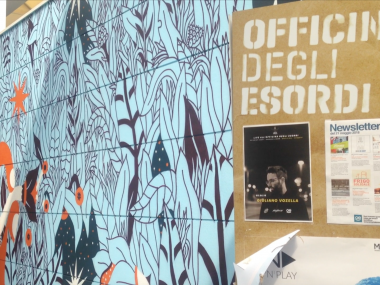SPACE TO COMMUNITIES! A RESILIENCE TEST IN THE CITY OF BARI
Edited on
13 April 2021Over the past six years, the city of Bari has experienced an intense season of social and urban transformation, in which a participatory tension has gradually characterized the whole urban development strategy. A process, positively perceived by residents, investing in the thickening of social capital and encouraging exchanges of values among citizenship, such as active participation, sociability, proximity, community belonging. On these assumptions, most of the urban policies implemented during this period challenged the consolidated practices of top-down design, involving citizens and neighbourhoods, in all phases of the urban strategy: from the envisioning phase to the implementation of policies.

In particular, the urban development strategy of Bari moved around three pillars:
- strengthening the role of the 12 city districts as accessible spaces for community development and cultural production, places where to express new ideas of active citizenship;
- boosting existing and creating new public spaces such as parks, markets, playgrounds, social innovation centres, libraries, kindergartens, schools, by investing in material infrastructures available to local communities and their activities;
- cultivating skills and networks for the acceleration of local entrepreneurial initiatives, promoted by local and foreign citizens, to gradually support the formation of a neighbourhood entrepreneurial ecosystem, dedicated to social and cultural innovation.
In this framework of interventions, the “Urban Civic Networks” (Reti Civiche Urbane, or RCU in Italian language) measure represented the system action enabling a coordination of these efforts and the energy of communities. RCU policy has in fact encouraged the creation of 12 permanent consortia in as many city districts, totally bottom-up and autonomously built by neighbourhood committees, schools, civic organizations, NGOs, cultural industries, volunteering associations, churches, willing to co-design and implement some 18-month socio-cultural animation program in their own territory.
An experiment of civic self-determination, able to assess the will and readiness of the communities to build a shared vision and a working method, based on collaborative values. Such a path allowed Bari to grow a powerful multilevel intangible infrastructure that today directly involves more than 300 organizations and 10,000 people over the 12 districts, thus enabling the City to have 12 stable, locally rooted interlocutors for discussion. The intermediation of RCUs is proving extremely effective in designing common urban transformation strategies, encouraging the emergence of cooperative projects, sharing objectives for the reuse of abandoned public buildings and open spaces, aggregating ideas, needs and skills on a local basis.
A work that over time has being consolidating in the citizens a strong sense of belonging to the city together with a strong local and community identity, representing a strong point for Bari during the first Covid-19 lockdown. In a pandemic Europe, where the public urban debate stepped back to reflect on the value of proximity, closeness and solidarity, the city of Bari fortunately appeared to have an advantage.
The RCUs, in fact, immediately reorganized in solidarity, becoming indispensable in the daily actions in their neighbourhood, acting as collective organizations, supporting the needs of the most vulnerable people, facilitating the emergence of spontaneous forms of voluntary proximity. From the experience of RCU, “BARI SOLIDALE” arose: an urban network of 700 volunteers who, during the lockdown, delivered medicine, food and basic necessities to the neediest families in the city, through 10 neighbourhood hubs, created in schools, churches and family centres for storage and distribution.
Many of the volunteers came from RCU experiences, others from the social and cultural sector, still others from Catholic or environmental activism. Certainly, working overtime on community membership and strengthening the neighbourhood principals has provided the Municipality of Bari the capacity to organize timely responses, especially towards elderly, poor, immigrant and disabled people.
The volunteers, coordinated by the Welfare Department, in addition to distributing goods, stimulated the contributions of local businesses and enterprises, fuelling a virtuous circuit of widespread donations. Thus, Bari experienced an extraordinary proof of activism and subsidiarity, as well as participation, in both social practice and cultural circuits. In fact, during the lockdown emergency, the 12 RCUs, coordinated by the Municipality, transferred most of their cultural programmes and activities to digital platforms, promoting the digital participation of residents and facilitating dialogue between people even at a distance. It was another attempt to continue working on proximity, albeit in different ways, pursued by simply keeping the communities together and providing virtual spaces where they could share and discuss the extraordinary experience they were living.
Although we are all aware of the potential and limitations of digital engagement, especially in term of quality of fruition and accessibility, the digital transition of the RCU practices represented an important resilience experiment for Bari, and particularly a sort of technical test for the local administration, to intensify the principles of active citizenship and participation through a platform and a dedicated digital space. The “BARI PARTICIPA” web tool was published last June, at the end of the lockdown, to allow citizens to stay in permanent dialogue with the Administration about plans and projects, enabling discussion or applying to manage a public good through the website www.bariinnovazionesociale.it.
Each city is learning something new and different from its past, struggling to find the right way to continue practicing their values despite the pandemic emergency. This is why the City’s participation to Com.Unity.Lab, the URBACT transfer network and the model exchange between 8 cities (where Bari works together with Aalborg, Den Haag, Lille, Lisbon, Lublin, Ostrava and Sofia) represent an extraordinary opportunity to consolidate know-how on the subject of social participation under the leading experience of Lisbon.
Now that the threat of another lockdown is emerging in Italy, citizens are more ready and less afraid of loneliness and exclusion. Despite the limits, the anomalies and the social and economic emergencies that a new lockdown can generate in Bari, they know they belong to a supportive community, ready to intervene and make them participate.
 Submitted by Daniela Patti on
Submitted by Daniela Patti on
